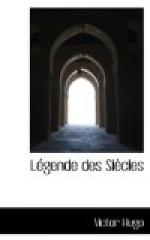L. 232. Zoroastre. Zoroaster was the founder
of the Persian religion.
He was a great observer of the stars.
L. 245. Fatalite. In Victor Hugo the word denotes, not so much destiny, as the feeling or the doctrine that man is the helpless victim of an unseen and cruel power. It is a gloom which overhangs human life, from which in the progress of the ages man will be delivered. Compare La Vision d’ou sortit ce livre, where the spirit of ‘Fatalite’ is associated with paganism and contrasted with the spirit of religion. In Dieu again ‘Fatalite’ is one of the three sombre deities of paganism, the other two being Venus, the goddess of pleasure, and Hecate, the goddess of death. Cf. also the following lines from La Fin de Satan, put into the mouth of man’s evil angel:—
Je suis Lilith-Isis, l’ame noire
du monde.
Tremble! l’etre inconnu, funeste,
illimite,
Que l’homme en fremissant nomme
Fatalite,
C’est moi. Tremble! Ananke,
c’est moi. Tremble! Le voile
C’est moi.
And again in Satan’s speech to the Almighty:—
Tu seras Providence et moi Fatalite.
Notre-Dame de Paris is based upon this theme. See especially Livre VII. iv.
L. 255. For the metaphor compare ‘la fausse clef du fatal gouffre bleu’, l. 37, and the following passage in L’Ane about the prison of life:—
La porte en est massive et la voute en
est dure;
Tu regardes parfois au trou de la serrure,
Et tu nommes cela science; mais tu n’as
Pas de clef pour ouvrir le fatal cadenas.
L. 273. Cf. the well-known line in Les Contemplations: Ce que dit la Bouche d’Ombre:—
Le fauve univers est le forcat de Dieu.
Man is likened to a convict, in that he is undergoing punishment, not in that he deserves it.
Allioth, a star of the first magnitude in the Great Bear.
J’en arrive: ’Tis from there I come.
la pesanteur. Gravity symbolizes the forces which keep man down.
guebres, fire-worshippers, i.e. the Persians, who still adhere to the ancient religion of Zoroaster. The word itself is Persian.
Thales (English Thales), one of the seven wise men of Greece.
L. 317. An allusion to the well-known doctrine of the music of the spheres, enunciated by Plato.
chouette. The owl, as a bird of darkness, was to Hugo suggestive of evil things. Cf. La Confiance.
frisson des roseaux, i.e. a trembling like that of reeds.
Spinosa (English Spinoza) (1632-77), the Jewish philosopher, whose rationalistic views would be evidence to Hugo of his need of faith.
Hobbe. Thomas Hobbes (1588-1679), the famous English philosopher, is best known by his defence of absolute monarchy. In ethics he held that man is swayed only by the desire for pleasure and the fear of pain. Either of these views would be to Hugo a system of despair.




